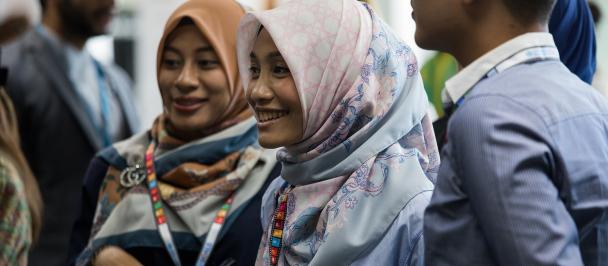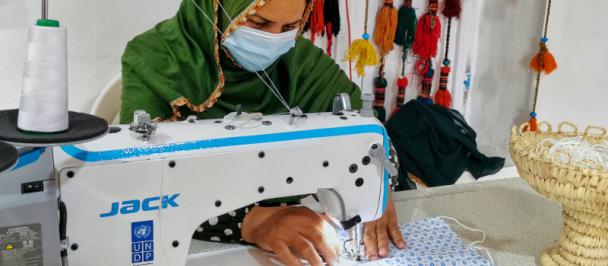In response to the urgent call for action on climate change, more than 110 countries have pledged carbon neutrality by 2050 and many more are working on improving their national climate targets ahead of the United Nations Climate Change Conference COP26 next year. And yet, climate change does not only compel us to jointly and urgently act, it also requires us to carefully consider how water can contribute to addressing the dual crises of climate and nature, and meet the Sustainable Development Goals.
Around the world, we observe how climate change affects water resources, threatening basic needs and human rights to water and sanitation. Four billion people face severe water scarcity for at least one month per year.
When disaster strikes, it often strikes through water. Floods, landslides, storms and droughts are becoming more frequent and more intense, threatening not only human lives, but also vital ecosystems and our progress on economic and social development. In the last two weeks, we have seen two hurricanes, Eta and Iota, devastate parts of Central America, exacerbating the pre-existing humanitarian crisis and vulnerability of indigenous people lacking access to water and sanitation. Globally, climate change has inflicted some US$650 billion in economic losses over the last three years alone, according to Morgan Stanley, a financial services company.
The COVID-19 pandemic has further exposed the deep inequalities and fragilities of societies, poignantly illustrated through access to water. While hand-washing remains one of the most critical lines of defense against the spread of disease, three billion people do not have a handwashing facility at home. And one in four health care facilities lack basic water services.
Water resources for climate change adaptation and mitigation
Most countries are well aware of the risks and the importance of building adaptive capacity; among the 137 countries that included adaptation in their 2015 national climate pledges under the Paris Agreement (NDCs), water was the most prioritized area for adaptation action.
Under the Climate Promise, UNDP is now helping 115 countries deliver even stronger climate commitments. We are supporting dozens of countries who have chosen to strengthen water-related measures to help reduce emissions or adapt to impacts. In addition, some of UNDP’s largest water-related programmes are supported through the Climate Change Adaptation portfolio.
One aspect that has often been overlooked, however, is the role of water to support countries’ proposed emission reduction measures. Nature-based solutions such as green infrastructures can boost carbon sequestration and replenish water resources. But water resources can also be negatively impacted by climate actions. Shifts in the energy mix towards hydropower or biofuels, for instance, may face limitations posed by availability of water and competing resource demands. The UNDP and its partners assist countries to consider the interactions between the different roles of water when enhancing their NDCs.
Water and wastewater utilities directly and indirectly have been reported to contribute between three percent and seven percent of countries’ greenhouse gas emissions. The direct emissions are caused by methane and nitrous oxide released from wastewater treatment and, possibly more importantly, the waste and wastewater that is not adequately treated. Indirect emissions are generated through the energy used in water abstraction, transmission and treatment.
This is not only driven by the high demand for water in our economic activities, but also by the massive inefficiencies in water supply and distribution. According to the World Bank, around 45 million cubic metres of water are lost daily with an economic value of over US$3 billion per year in developing countries. Addressing those inefficiencies would not only allow us to expand access to water for millions of people, but also to save water and energy and reduce the respective emissions generated through water and wastewater management activities.
Building forward better
The current economic, climate and public health crisis provides an opportunity to improve the management of our water resources and to expand the reach of water and sanitation services. Where governments, civil society and the private sector work together, services can be extended to the 785 million people still lacking access to basic water in 2017, and to the two billion who still have to live without basic sanitation. As countries devise recovery plans and gear up to enable behavior change towards improved hygiene – investing in information, access, and expanded infrastructure – we call for these investments to advance a green, resilient and equitable development pathway.
In collaboration with the Green Climate Fund and the Global Environment Facility - Least Developed Countries Fund, the UNDP is supporting climate change adaptation that includes rainwater harvesting and the extension of services to outer atolls in Small Island Developing States, including Solomon Islands, Maldives and Marshall Islands.
Through the UNDP-GEF – International Waters collaboration we are one of the world’s major actors in integrated water resources management in the transboundary context. Applying an ecosystem-based approach, these programs contribute to both climate change adaptation and mitigation. Through the International Capacity Development Network for Sustainable Water Management (Cap-Net), we assist water practitioners with climate change adaptation and mitigation, where Solar-Powered Water Systems has been one of the trainings in most demand.
To assist countries to include water more productively in the process of enhancing their national climate pledges UNDP and its partners (including AGWA, GWP and SIWI through the UNDP-SIWI Water Governance Facility partnership) have run a series of workshops on water and climate to improve the coordination across climate and water decision-makers and professionals. Additional workshops in different languages and regions are under development.
Working across 170 countries and territories, UNDP will continue to collaborate with partners to pool resources and know-how to help expand access to basic services and equitable and sustainable resources management. We will draw intelligently on water management to ensure that climate actions and socio-economic interventions put our future on a sustained path towards carbon neutrality.
This article was orginally published here.

 Locations
Locations



